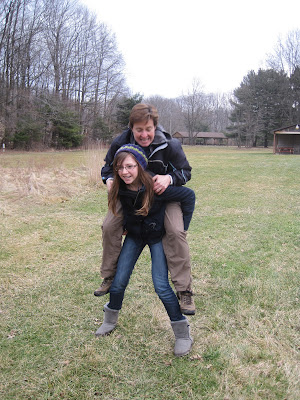 |
| Troop 71009 standing in front of Raccoon Roost. |
I took my Girl Scout troop of eighth graders to a camp in Trumbull County, Ohio, over the weekend. We were fortunate to have mild weather: temperatures in the 40s during the day and sinking to the mid-20s at night. Our cabin, built in the 1950s, was the original caretaker's cabin. It was constructed with a
wood-burning stove for the sole heat source and
no indoor plumbing. We had to stoke the stove every 2.5 hours, heat any water we wanted to clean dishes with, and prepare three basins of water (from containers I brought from home) to clean up after each meal. The first basin's hot water and soap was for washing, the second's bleach/water combination was for sanitizing, and the third's water was for rinsing. Cleaned dishes went in dunk bags and air dried.
 |
| Amy stokes the wood-burning stove. |
 |
| Carli & Tina wash dishes. |
The girls planned the menu and I tweaked it. I decided we'd make a dump cake for dessert Friday night and a hashbrown-sausage-egg casserole bake for breakfast Saturday--in a Dutch oven,
a cast-iron pot that you heat with coals and that I had learned to use in theory and training, but not practice.
 |
| Carli, Megan W., & Kathryn learn that Dutch oven cooking isn't quick. |
Does it surprise anyone that most of our time and energy was devoted to keeping the cabin heated, cleaning up after meals, and trying to cook with the Dutch oven?
There wasn't much grumbling. Any sissies I might have had in my troop dropped out long ago. The girls know me, and accepted the fact that we
spent all Saturday morning trying to follow the recipe before admitting defeat and popping the dutch oven sans lid in the beat-up indoor oven so we could finally eat breakfast at 12:30 pm.
 |
| Bethany's soup on the stove complimented our grilled cheese in the pie irons for lunner after our late brunch. |
That afternoon we were working on requirements for a couple of Cadette awards. One of the prompts was, "I'm glad I'm alive because..." The girls gave some thoughtful answers. Then Bethany blew us all away with hers. "I'm glad I'm alive for
all the little things," she said.
We pressed her. "What do you mean?"
She shrugged. "You know, all the things that
take you by surprise as you're going about your life. You
may not expect them and when they happen
you sit back and go, "Whoa, that's so cool; and it really makes you think and appreciate that you're here to notice them."
 |
| Tina gets 'em going. |
 |
| My turn. |
 |
| Boom, boom, pow. Hammering the sign back in. |
 |
| Blind trail. |
Like the
orange glow from the moon that transfixed us Friday night as we spent way too long squatting in the fire ring trying to heat our coals to cook our dump cake. Like the amazingly good percussion routine the girls spontaneously
created with the lummi sticks they found in a corner of the cabin while they waited for one of their meals. And like the way one girl
whispered heartfelt advice to another in the wee hours of the morning, when they thought everyone else was sleeping, about boys.
 |
| Our luxury sleeping accommodations. |
The little things. The things that when they happen, you
stop what you're doing for a minute to appreciate them. The things that when you recall them, they
bring back that powerful feeling you had the first time. The things that
make life worth living. Sometimes it takes a child to remind us jaded, over-worked adults of the wonder of the world. It's out there,
just waiting for us to notice it.
Kim Van Sickler

.jpeg)
.jpeg)
.jpeg)





























